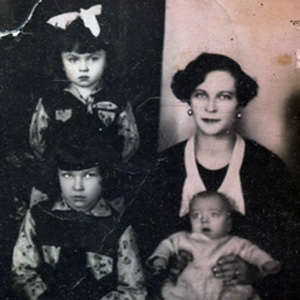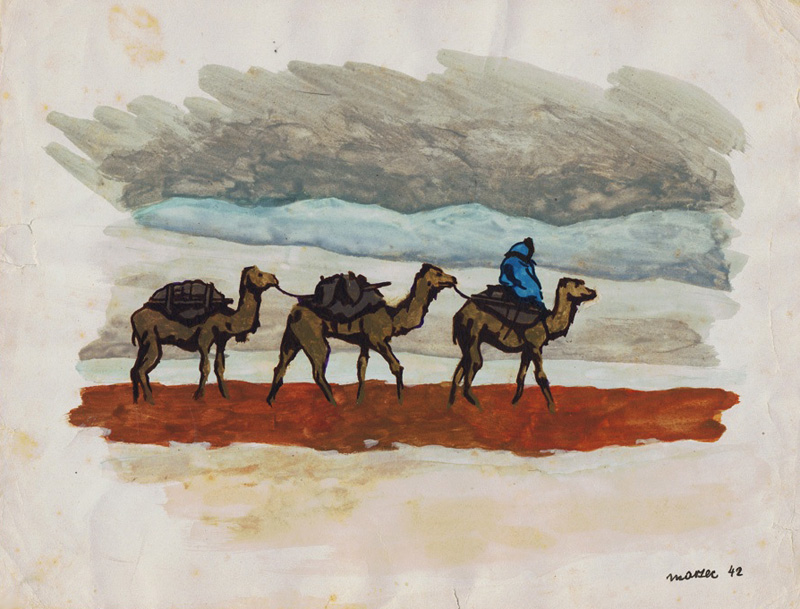“Nobody knows how horrible it is to be thrown out of your house and leave everything behind.” Halina Babinska was ten when she went through this terrible experience.
In the middle of the night during World War II, Soviets came and threw the young girl and her family out of their homes. Like thousands of Poles, the young Mrs. Babinska, her two siblings and parents were packed onto the shelves of cattle trains “with a hole for a toilet” and deported to labor camps in Siberia.
“It’s like pulling out a tree with the roots. You are uprooting a person,” explained Mrs. Babinska in a calm, dignified voice. And uprooted she was many a time in her life. After Germany invaded Russia, Stalin liberated Polish prisoners and their families. Poland was still at war, and the Poles from Siberia migrated to the four corners of the planet.
Erratum: Hitler invaded Russia in 1941, not 42, as stated in the video.
Now a Montreal resident, six decades later, Halina Babinska recalls her incredible childhood with laughter. But at that time, she often experienced life-threatening conditions.
From Siberia, “we all arrived by the boat to Pahlevi on the Iranian shore. We came from Krasnovosk [in Russia],” explained Mrs. Babinska. The crossing on the over-packed ship took two days. What did she eat? “I don’t even recall if I ate. You just cannot imagine the boat. There wasn’t a space to pass through. There were endless lines to the toilet.”
Every step was a potential threat to be separated from her mother and sister. Halina’s brother had stayed behind in Russia, sick with typhus, and her father had died. But only Halina knew that at that point. Her mother would soon die at her feet from exhaustion.
Mrs. Babinska and her sisters stayed in the beautiful Iranian city of Isfahan during a couple of years, a ‘transit city’ where many Polish orphans stayed before being transferred to Africa, New Zealand or Argentina. “I was lying in bed every night thinking about my brother in Russia. I knew my father died. I worried…”
“Nobody knows how horrible it is to be thrown out of your house and leave everything behind.” Halina Babinska was 10 when she went through this experience one night during the Second World War.
“It’s like pulling out a tree with the roots. You are uprooting a person,” Babinska recounted in a calm, dignified voice.
The Babinskis were packed into freight trains by the Soviets and deported to slave labour camps in the Russian Gulag.
In June 1941, Germany unexpectedly attacked Russia. Unable to fight back alone, the Soviets were forced to seek help from Poland’s allies, Britain and America. But this meant having to release their Polish prisoners.
Once again, Halina Babinska had to move, but this time, her family embarked on a desperate and harrowing trek across Russia to Krasnovodsk, in southern Russia.
Their only hope of escape was to get there in time to be evacuated from Russia on one of the barges taking the newly formed Polish army across the Caspian Sea to Iran.
“Every available space on board was filled with passengers,” described writer Ryszard Antolak, a specialist of Iranian and Eastern European history.
“Some of them were little more than walking skeletons covered in rags and lice.”
Now a Montreal resident, six decades later, Babinska recalls her unbelievable childhood with laughter.
But at that time she often experienced horrible, life-threatening conditions.
From the four corners of the Soviet Union, 115,000 Poles, including 18,000 children, arrived by boat to Pahlevi on the Iranian shore. The crossing took two days.
“I don’t even recall if I ate,” Babinska said. “You just cannot imagine the boat. There wasn’t a space to pass through. There were endless lines to the toilet.” People fell like flies, dying from typhus, dysentery and scarlet fever.
Every step was a potential threat to be separated from her mother and sisters. Young Halina’s sick brother stayed behind in Russia, and her father had died.
Keeping this news from her sick mother, the young child led the family on board a ship.
Arriving in Pahlevi, Halina supported her mother as they walked to the Red Cross medical facilities set up for the refugees. Before they reached it, her mother collapsed and died at her feet.
Halina then declared herself the “mother” to her two younger sisters, and resisted all efforts to have the three children sent to an orphanage. Finally, she agreed, but only on the condition they remained together.
Orphanages were established in the sacred ancient Iranian city of Isfahan. It was believed that in the pleasant surroundings and salutary air of this beautiful city, children like little Halina Babinska would have a better chance of recovering their physical and mental health.
Poles were extremely grateful to Iranians, who received them very well. Even the Shah took a special liking to Polish children and let many of them swim in his royal pool.
Some refugee camps were even set up amongst the flowers and fountains of his private gardens.
Although she lived in good conditions and went to school, young Halina couldn’t stop thinking about her family.
“I was lying in bed every night, thinking about my brother in Russia. I knew my father died. I worried…”
Halina would be reunited with her brother in a stroke of good luck. Her voice heightened as she described the fateful day she was allowed to go on a walk with her friends. It was at four in the afternoon, the hour when gardens were watered.
The then 12-year-old girl was standing on a balcony giving out onto the main street while her friend was at the dentist’s office.
“I looked down: there was a group of young boys with a tutor. They all had the same suits.”
Babinska’s voice grew excited as she described this moment. “I suddenly shouted: ‘look, my brother is there!'”
“Don’t be silly,” replied her friend.
But Halina ran downstairs. She didn’t see her brother’s face, but she knew it was him.
She touched his shoulder. “What are you doing here, Ryszard?”
He was going to Africa, looking for his sisters. “‘Well,’ I said, ‘you’re not going anywhere,'” Halina replied. And so it was.
The four children went to different schools but saw each other regularly. Later, when facilities in Iran were closed, Ryszard went to a military training camp in Palestine. Halina and her sisters were sent to Lebanon.
However, the girls couldn’t stay there forever. Halina had to choose between Argentina, Australia and Canada.
When Canadian authorities told Halina she would have to come alone, Halina refused.
“We fought to be together. We wouldn’t allow anybody to separate us. Even Russians couldn’t separate us.” Halina wouldn’t give in, but Canada did. They came here together.
“I knew what to expect, more or less… My feeling was that I’m coming to a backward country, because Beirut was a very European city, like the Paris of the Middle East.”
But Halina rolled up her sleeves, worked as a maid and sent her sister to school. She later attended university where she met her husband and was eventually head of social services at the Queen Elizabeth Hospital.
Halina Babinska will be a special guest at a screening of a documentary about 1,000 Polish children who went from Isfahan to New Zealand.
Mrs. Babinska was to be among them but the strong-willed “mother” refused to go to another orphanage, insisting on setting up a “family” with her sisters instead. And so she did.
CR



